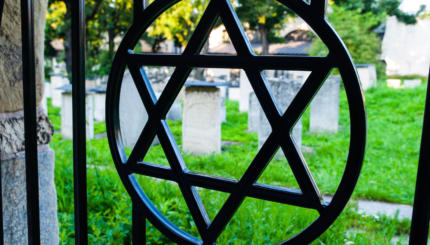When mourning a loved one, it is hard not to feel alone in the world and like no one will ever be able to fill the void that has been left.
Ironically, as lonely as grief can be, it is one of life’s most universal experiences. And from ancient times to the present, people have been writing about it. While nothing can take your pain away, many mourners get some comfort from reading poems and other texts that address loss, mortality and grief.
We encourage you to explore the Book of Psalms, which, as this article notes, Jews and others have for centuries turned to “for solace, guidance, catharsis, renewal, and much more.” Another popular biblical text at times of loss is The Book of Job, which addresses head on and often very poetically, the question of why God allows bad things to happen to good people. In addition, many people find the words of the Mourner’s Kaddish comforting.
A number of contemporary books, such as For Those Left Behind: A Jewish Anthology of Comfort and Healing and Grief in Our Seasons: A Mourner’s Kaddish Companion offer an array of inspiring poems, quotes and other readings.
With your help, My Jewish Learning can provide endless opportunities for learning, connection and discovery.
Below are some of our favorite Jewish quotes, poems and texts for comforting mourners. Did we miss a special quote or a book that helped you get through a hard time? Leave it in the comments below or email us at community@myjewishlearning.com.
Don’t Be Afraid of Pain
We can endure much more than we think we can; all human experience testifies to that. All we need to do is learn not to be afraid of pain. Grit your teeth and let it hurt. Don’t deny it, don’t be overwhelmed by it. It will not last forever. One day, the pain will be gone and you will still be there. — Rabbi Harold S. Kushner, a contemporary American rabbi (from When All You’ve Ever Wanted Isn’t Enough: The Search For a Life That Matters)
There Is No Magic Answer
There is no magic answer to loss. Nothing, not even time, will make the pain completely disappear. But loss is transformative if it is met with faith. Faith is our chance to make sense of loss, to cope with the stone that rolls around in the hollow of our stomachs when something we loved, something we thought was forever, is suddenly gone. — Rabbi David Wolpe, a contemporary American rabbi (from Making Loss Matter: Creating Meaning in Difficult Times)
Rebuilding After Loss
“I will build an altar from the broken fragments of my heart.” — Rabbi Yehuda HaChasid, a Polish rabbi who, with a group of followers, moved to Jerusalem in 1700.
“Each Of Us Has a Name”
This Hebrew poem, by the Israeli poet known as Zelda (her full name was Zelda Schneurson Mishkovsky and she lived from 1914-1984) is translated here by Marcia Falk and is often read at funerals and memorial services, as well as at Jewish naming ceremonies.
What We Leave Behind
You can read the Hannah Senesh poem “There are Stars” (Yesh Kochavim, in the original Hebrew) in full here. The Hungarian-born Senesh was killed by the Nazis at age 23. She had moved to pre-state Israel but then returned to Hungary in 1944, in a doomed (and fatal) effort to help the anti-Nazi resistance fighters there. Here are the first few lines:
There are stars whose radiance is visible on earth
though they have long been extinct.
There are people whose brilliance continues to light
the world even though they are not longer among the living….
“If I Had Not Fallen”
This short passage comes from Orchot Tzadikim (The Ways of the Righteous), an anonymous book of Jewish ethical teachings written in 15th-century Germany:
If I had not fallen, I would not have picked myself up,
If I did not sit in darkness, I would not have seen the light.(Orchot Tzadikim, Shaar Hateshuvah, Shaar 26)
“God Takes Nothing”
This proverb comes from Midrash HaGadol, a collection of Midrash texts that was compiled in the 14th century:
God takes nothing from the world until He puts something else in its place.
“Strange Is Our Situation Here on Earth”
This passage by physicist Albert Einstein comes from “My Credo,” an article he wrote in 1932, which is cited here.
Strange is our situation here on Earth. Each of us comes for a short visit, not knowing why, yet sometimes seeming to divine a purpose. From the standpoint of daily life, however, there is one thing we do know: that man is here for the sake of other men — above all for those upon whose smiles and well-being our own happiness depends.
Three Levels of Mourning
This is a Hasidic teaching that Rabbi Abraham Joshua Heschel often quoted, according to Heschel, Hasidism and Halakha:
There are three ascending levels of mourning: with tears — that is the lowest. With silence — that is higher. And with a song — that is the highest.
Sign up for a Journey Through Grief & Mourning: Whether you have lost a loved one recently or just want to learn the basics of Jewish mourning rituals, this 8-part email series will guide you through everything you need to know and help you feel supported and comforted at a difficult time.
Looking for a way to say Mourner’s Kaddish in a minyan? My Jewish Learning’s daily online minyan gives mourners and others an opportunity to say Kaddish in community and learn from leading rabbis.



